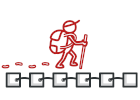
Iterator em Python
O Iterador é um padrão de projeto comportamental que permite a passagem sequencial através de uma estrutura de dados complexa sem expor seus detalhes internos.
Graças ao Iterator, os clientes podem examinar elementos de diferentes coleções de maneira semelhante usando uma única interface iterador.
Complexidade:
Popularidade:
Exemplos de uso: O padrão é muito comum no código Python. Muitos frameworks e bibliotecas o usam para fornecer uma maneira padrão de percorrer suas coleções.
Identificação: O iterador é fácil de reconhecer pelos métodos de navegação (como next, previous e outros). O código cliente que usa iteradores pode não ter acesso direto à coleção que está sendo percorrida.
Exemplo conceitual
Este exemplo ilustra a estrutura do padrão de projeto Iterator. Ele se concentra em responder a estas perguntas:
- De quais classes ele consiste?
- Quais papéis essas classes desempenham?
- De que maneira os elementos do padrão estão relacionados?
main.py: Exemplo conceitual
from __future__ import annotations
from collections.abc import Iterable, Iterator
from typing import Any
"""
To create an iterator in Python, there are two abstract classes from the built-
in `collections` module - Iterable,Iterator. We need to implement the
`__iter__()` method in the iterated object (collection), and the `__next__ ()`
method in theiterator.
"""
class AlphabeticalOrderIterator(Iterator):
"""
Concrete Iterators implement various traversal algorithms. These classes
store the current traversal position at all times.
"""
"""
`_position` attribute stores the current traversal position. An iterator may
have a lot of other fields for storing iteration state, especially when it
is supposed to work with a particular kind of collection.
"""
_position: int = None
"""
This attribute indicates the traversal direction.
"""
_reverse: bool = False
def __init__(self, collection: WordsCollection, reverse: bool = False) -> None:
self._collection = collection
self._reverse = reverse
self._sorted_items = None # Will be set on first __next__ call
self._position = 0
def __next__(self) -> Any:
"""
Optimization: sorting happens only when the first items is actually
requested.
"""
if self._sorted_items is None:
self._sorted_items = sorted(self._collection._collection)
if self._reverse:
self._sorted_items = list(reversed(self._sorted_items))
"""
The __next__() method must return the next item in the sequence. On
reaching the end, and in subsequent calls, it must raise StopIteration.
"""
if self._position >= len(self._sorted_items):
raise StopIteration()
value = self._sorted_items[self._position]
self._position += 1
return value
class WordsCollection(Iterable):
"""
Concrete Collections provide one or several methods for retrieving fresh
iterator instances, compatible with the collection class.
"""
def __init__(self, collection: list[Any] | None = None) -> None:
self._collection = collection or []
def __getitem__(self, index: int) -> Any:
return self._collection[index]
def __iter__(self) -> AlphabeticalOrderIterator:
"""
The __iter__() method returns the iterator object itself, by default we
return the iterator in ascending order.
"""
return AlphabeticalOrderIterator(self)
def get_reverse_iterator(self) -> AlphabeticalOrderIterator:
return AlphabeticalOrderIterator(self, True)
def add_item(self, item: Any) -> None:
self._collection.append(item)
if __name__ == "__main__":
# The client code may or may not know about the Concrete Iterator or
# Collection classes, depending on the level of indirection you want to keep
# in your program.
collection = WordsCollection()
collection.add_item("B")
collection.add_item("A")
collection.add_item("C")
print("Straight traversal:")
print("\n".join(collection))
print("")
print("Reverse traversal:")
print("\n".join(collection.get_reverse_iterator()), end="")
Output.txt: Resultados da execução
Straight traversal:
A
B
C
Reverse traversal:
C
B
A